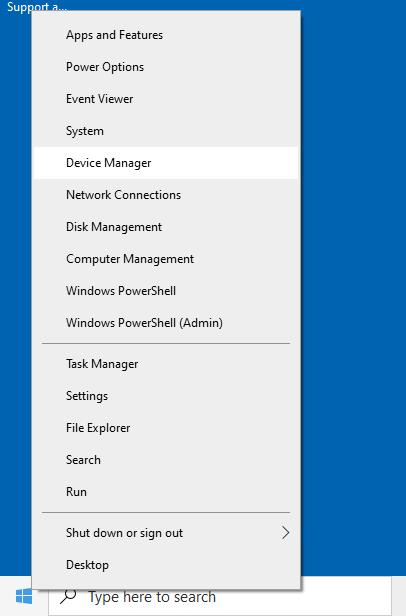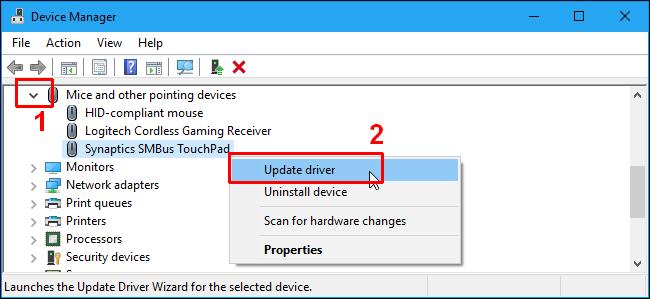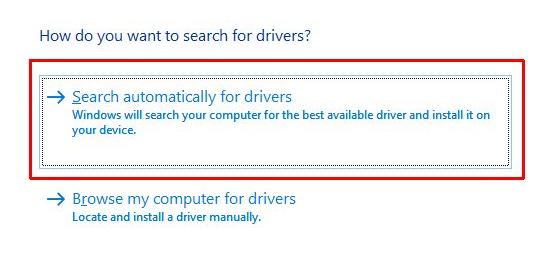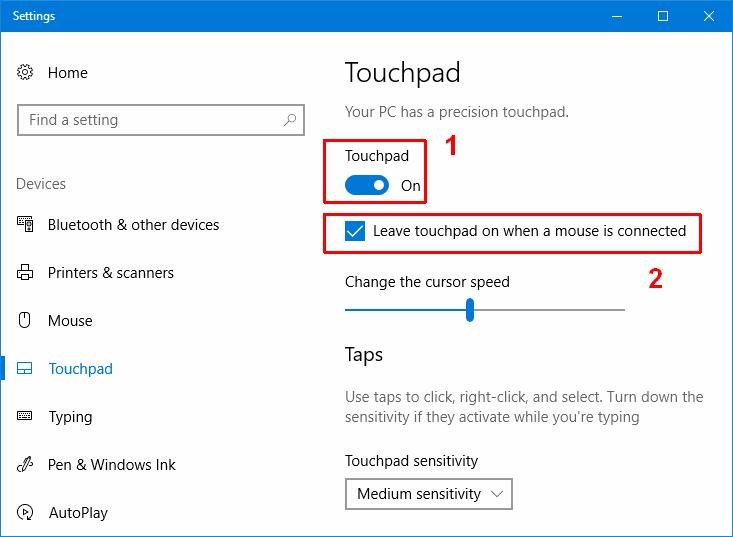Most touchpads on laptops and notebooks are using a Synaptics device. For the touchpad to work, Windows will need a Synaptics touchpad driver to be installed. The driver ensures the touchpad is recognized as a pointing device, replacing the need for an external mouse.
But even if you prefer an external mouse, it is good to have the touchpad working so that you have a working pointing device in case you forget the mouse. And don’t forget about all the extra features modern touchpads offer (e.g. multi-finger gestures, area taps, etc.).
Install a Driver Using the Device Manager
Depending on the Windows version you’re using, support for many devices is included. As such, it’s possible to use the Windows Device Manager to install the Synaptics touchpad driver.
It is not guaranteed that the driver will be the latest version from the manufacturer, nor may it offer all features. However, in many cases, a working pointing device can be achieved using the Windows Device Manager.
For Windows 10:
- Right-click the Start button.
- In the popup menu that appears, click Device Manager.

- In Device Manager, locate the entry called “Mice and other pointing devices”, and then click to expand that category.
- The Synaptics pointing device should be listed here as something called “Synaptics SMBus Touchpad”.
Note: If the Synaptics SMBus Touchpad is not listed in this category, check if a category called Other devices exists, and then open that (1). The device will be listed there with a different name, most likely as Unknown device. Just click that and then follow the next steps. - Right-click the device and then click Update driver (2).

- Next, select the option to Search automatically for drivers.

- Wait for Windows to search for the driver and install it.
Note: If the driver fails to install, you may need to download the driver from the PC manufacturer’s support site.
Enabling the Synaptics Touchpad Driver
If no device is shown in the Device Manager at all, make sure you haven’t disabled the touchpad on your laptop.
Some laptop manufacturers have incorporated special function keys to disable and enable the touchpad (Asus laptops use Fn + F9 or Fn + F6, Dell uses Fn + F3, Lenovo uses F6, etc. – see your laptop manual for details).
Check if the touchpad is enabled in Windows 10, by using the Windows search bar and then typing “touchpad settings”. Click Touchpad settings under the best match results, and make sure that Touchpad (1) is set to On.

In addition, check whether the setting for ‘Leave touchpad on when a mouse is connected‘ (2) is enabled or disabled. If it is disabled, and an external mouse is connected, the touchpad will also be disabled.
You may also use the Settings -> Bluetooth & devices (1)-> Touchpad (2) option directly to access the touchpad settings. This will also allow you to directly enable or disable the Touchpad (3).

How to Manually Install a Synaptics Touchpad Driver from the Manufacturer
To manually install a Synaptics touchpad driver, you first need to download the driver installer from the laptop manufacturer. Using the specific touchpad driver from the manufacturer will guarantee that all functionality is available. Manufacturers often offer features beyond the standard Synaptics touchpad driver, even though it is not always the latest version of the Synaptics driver. This may include support for tap functions or the multi-finger gestures options.
- Locate the support website for your laptop brand.
- Look up the laptop model.
- Download the touchpad driver.
- After downloading, run the driver installer and follow the on-screen instructions.
Here are some of the more common support sites for laptop manufacturers:
Lenovo (For the Synaptics UltraNav Driver for Windows)
Hewlett Packard (HP)
Asus
Toshiba
Samsung
How to Automatically Install a Synaptics Touchpad Driver
If you’re not sure about the exact brand and model of your laptop, or you find manually installing a touchpad driver tedious, you can use DriverFinder to automatically locate the driver for you.
The DriverFinder program scans your laptop for all hardware devices that are present. Using its own device driver database, it locates the appropriate driver for the devices. This includes Synaptics touchpad drivers.
Note: Drivers in the DriverFinder database are sourced DIRECTLY from hardware manufactures so rest assured that the right driver update is recommended.
- Download the DriverFinder program.
- Get a license and Activate the program.
- Run a Scan using the program.
- Click the Update button next to the device in the scan results.

- Wait for the driver to be installed, or follow the on-screen instructions to install the driver.
Another benefit of using DriverFinder is that you can update ALL the drivers for your laptop (including sound drivers, video drivers, etc.), and not just the Synaptics touchpad driver.

